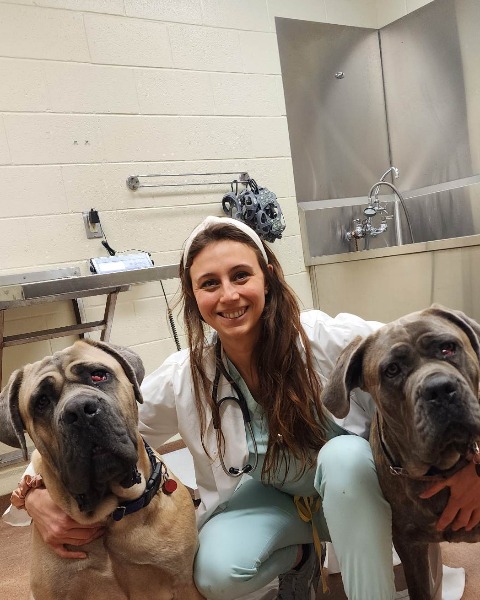Small Animal Internal Medicine
(GI30) Fecal Microbiota Transplant as an Adjunctive Treatment of Canine Chronic Pruritic Dermatitis
Thursday, June 19, 2025
5:30 PM - 7:00 PM ET
Location: Exhibit Hall Poster Park - Poster Stand

Marine Rullier, DMV, MS
PhD candidate & dermatology resident
Université de Montréal
St-Hyacinthe, QC, Canada
Research Abstract - Physical Poster Presenter(s)
Abstract:
Background: Intestinal microbiota imbalances may contribute to the inflammatory process in canine chronic pruritic dermatitis (CPD). Fecal microbiota transplantation (FMT) has been reported to improve atopic signs in both humans and dogs by restoring gut microbiota balance.
Objectives: To evaluate the impact of FMT on the intestinal microbiota composition of dogs with CPD. Animals: Fifteen adult dogs with CPD receiving non-steroidal antipruritics were assigned to either the treatment (n = 6) or placebo (n = 9) group. Nine healthy dogs served as controls.
Methods: The treatment group received an FMT enema from a healthy donor, followed by daily oral lyophilized FMT capsules for 30 days. The placebo group received an autologous FMT enema (self-derived feces) and placebo capsules (crushed kibbles). All dogs were fed the same diet. Clinical skin lesion scores (CADESI-04) and microbiota composition (16S rRNA sequencing, V4 region) were assessed before treatment and at day 30 (D30).
Results: At D30, no statistically significant differences were observed between groups. No significant changes in microbiota richness, diversity, or composition were detected at any time point (ANOVA and PERMANOVA, p > 0.05).
Conclusions: The FMT protocol did not alter the fecal microbiota composition in CPD dogs, likely due to the absence of dysbiosis. Despite the small sample size, a trend toward pruritus improvement was noted. Larger studies in dogs with confirmed dysbiosis are necessary to assess FMT’s potential for CPD management further.
Background: Intestinal microbiota imbalances may contribute to the inflammatory process in canine chronic pruritic dermatitis (CPD). Fecal microbiota transplantation (FMT) has been reported to improve atopic signs in both humans and dogs by restoring gut microbiota balance.
Objectives: To evaluate the impact of FMT on the intestinal microbiota composition of dogs with CPD. Animals: Fifteen adult dogs with CPD receiving non-steroidal antipruritics were assigned to either the treatment (n = 6) or placebo (n = 9) group. Nine healthy dogs served as controls.
Methods: The treatment group received an FMT enema from a healthy donor, followed by daily oral lyophilized FMT capsules for 30 days. The placebo group received an autologous FMT enema (self-derived feces) and placebo capsules (crushed kibbles). All dogs were fed the same diet. Clinical skin lesion scores (CADESI-04) and microbiota composition (16S rRNA sequencing, V4 region) were assessed before treatment and at day 30 (D30).
Results: At D30, no statistically significant differences were observed between groups. No significant changes in microbiota richness, diversity, or composition were detected at any time point (ANOVA and PERMANOVA, p > 0.05).
Conclusions: The FMT protocol did not alter the fecal microbiota composition in CPD dogs, likely due to the absence of dysbiosis. Despite the small sample size, a trend toward pruritus improvement was noted. Larger studies in dogs with confirmed dysbiosis are necessary to assess FMT’s potential for CPD management further.


